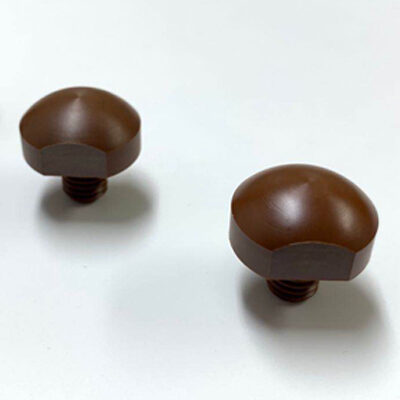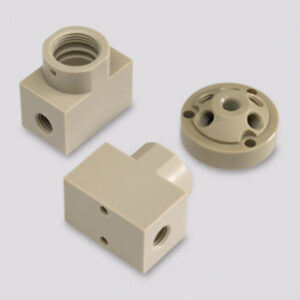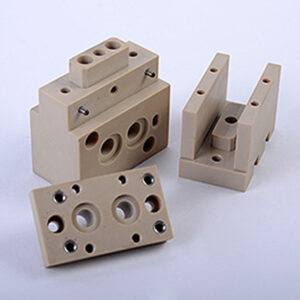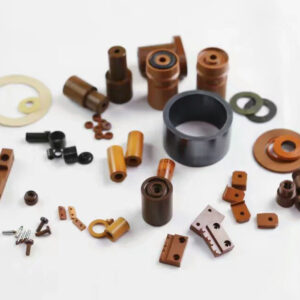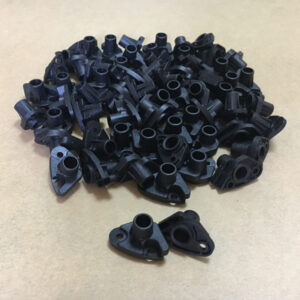Description
Polyimide (PI)
Polyimide is a non melting high temperature polymer. Strength, dimensional stability, and creep resistance remain high even at temperatures above 260°C. Low wear rates combined with the ability to work under unlubricated conditions and high pV-rates makes it the ideal material for challenging friction and wear applications, extending lifetime and reducing maintenance costs. Its high purity and low outgassing are needed for applications in the vacuum, space and semiconductor industry.
Special properties of Polyimide (PI)
- Long-term thermal stability 300 °C (short-term up to 400 °C)
- Good cryogenic properties down to -270 °C
- High strength, modulus and stiffness also at high temperatures over 260 °C
- Excellent wear resistance under high surface pressure and high sliding speeds
- Excellent thermal and electrical insulation
- Minimal thermal conductivity
- High purity, low outgassing in vacuum conditions in accordance
- Good machinability
- Good chemical resistance to acids, fats and solvents
- Highest flame retardant grade UL-94 V-0
- Irradiation resistance
- Aging resistance
- Polyimide is ideal for electrical and thermal insulating applications. More ductile than ceramics, and lighter weight than metals.
- Polyimide is an excellent choice for structural parts in aerospace and other applications where metal replacement is desirable.
- Polyimide sheet plate & Polyimide rod can be machined as wafer handling tools (wafer tips) IC Test Sockets & Probe Test Heads…
Polyimide Material Datasheet
| PI – Polyimide | |||||
| Polyimide (PI) is a non melting high temperature polymer. Strength, dimensional stability, and creep resistance remain high even at temperatures above 360°C | |||||
| Properties | Temperature | Test Standard or Instrument | Unit | PI-N | PI-G15 |
| Physical Properties | |||||
| Color | – | – | – | Brown | Black |
| Density | – | GB1033 | g/cm³ | 1.38-1.42 | 1.42-1.45 |
| Mechanical Properties | |||||
| Tensile Strength | 23℃ | GB/T1040-2006 | Mpa | 85 | 89 |
| 260℃ | 49.4 | 54 | |||
| Elongation at Break | 23℃ | GB/T1040-2006 | % | 6.3 | 3.7 |
| 260℃ | – | – | |||
| Tensile Modulus | 23℃ | GB/T1040-2006 | Mpa | 3140 | 4400 |
| 260℃ | – | – | |||
| Flexural Strength | 23℃ | GB/T1040-2000 | Mpa | 110 | 137 |
| 260℃ | 60 | 99 | |||
| Flexural Modulus | 23℃ | GB/T1040-2000 | Mpa | 2990 | 4500 |
| 260℃ | 1640 | 3000 | |||
| Compress Strength | 23℃ | GB/T1040-2000 | Mpa | 135 | 124 |
| 260℃ | 83.8 | 100 | |||
| Compress Modulus | 23℃ | GB/T1040-2000 | Mpa | 1620 | 1600 |
| 260℃ | 1410 | 1400 | |||
| lzod Unotched Impact Strength | 23℃ | GB/T16420-1996 | Kj/m2 | 83.2 | 45 |
| 260℃ | – | – | |||
| Thermal Properties | |||||
| Coefficient of Linear Expansion | 296-573K | μm/m/°C | 53 | 49 | |
| Deflection Temperature | GB/T 1634.2 | ℃ | >360 | >360 | |
| Electrical Properties | |||||
| Surface Resistvity | GB1410 | Ω | 1014 | – | |
| Volume Resistvity | GB1410 | Ω.cm | 1015 | – | |
| Dielectric Strength | – | KV/mm | 22 | – | |
| Dielectric Constant | – | – | 3.6 | – | |
| NOTE: *The data stated above are typical values intended for reference and comparison purposes only. *The data should not be used as a basis for design specifications or quality control. *The information is provided as a guide to the best of our knowledge and given without obligation or liability. *Testing under individual application circumstances is recommended. | |||||
| * PI-N, Natural (Unfilled) PI | |||||
| * PI-G15, 15% Graphite Filled PI | |||||

